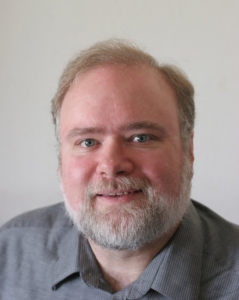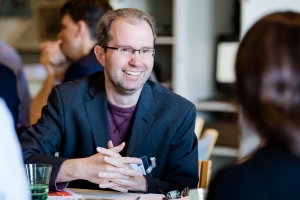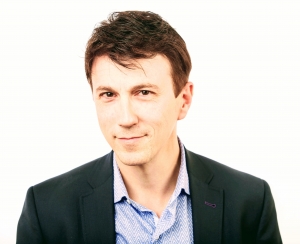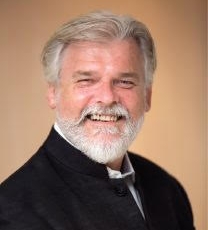Divya Chander is an anesthesiologist (MD UCSD, residency UCSF) and neuroscientist (PhD UCSD) who also works at the intersection of health, data, technology, and data security. She is a practicing physician, Chair of Neuroscience and Faculty of Medicine at Singularity University, former faculty in the Stanford Department of Anesthesiology, and Senior Non-Resident Fellow at the Atlantic Council GeoTech Center.
An advocate for data and biometric rights, she serves as medical advisor to the Extended Reality Safety Initiative (XRSI.org), and is helping develop standards for identity and sensitive healthcare data security. Dr. Chander also leads 2 companies she co-founded during the pandemic – Lucidify, a continuous, intelligent brain monitoring platform for the detection of delirium, and Plexxus, a company building the data security fabric for secure communications and transactions, supporting the integration of IoT devices to help build the world’s connected global immune system.
She was named one of 2020’s top digital health innovators by Intelligent Health AI. Dr. Chander also served on a NASA task force for COVID19, and directed the post-pandemic global health initiative for OneShared.World.
Her research involves mapping consciousness and writing algorithms for the automated tracking of altered states, elaborating theories of consciousness (which she presented on the TED-NYC and UN stages), predicting the effect of human augmentation on consciousness, and how mapping consciousness in humans may enable us to recognize it in non-human, intelligent beings (both on and off-planet, through initiatives like SETI, where she joins the newly formed Complexity Group).
Dr. Chander also contributes to space life sciences and medicine. A finalist for astronaut selection and an alumnus of the International Space University, Dr. Chander has performed remote simulations of trauma rescues, anesthesia and surgery in Mars analogue settings. Her desire to alter her own Consciousness is to someday see the Earth rise from the surface of the moon.
Sample Topics
Digital Health, Medical XR, and Hacking Humans – New Solutions for CyberHealth
Digital health and associated spheres like medical extended reality, wearables and implantables, provide new opportunities for extended healthcare access and medical training to a wide swath of the population. Further, pandemic resilience requires the creation of integrated warning systems that can collect and integrate sensitive data at the edge. In many cases, the data collected passively and actively by devices at the edge include biometrics and biometrically-inferred data – the most sensitive data we own. User identification, authentication, data collection, storage, and connectivity on both decentralized and aggregated networks create new threat landscapes that are exacerbated by key edge vulnerabilities. In this talk, we explore some of this new risk landscape, as well as new network solutions and frameworks that provide means for user-centric control, security, and privacy, which will revolutionize both cyberhealth networks as well as edge-based user interactions with Web 3.0 and the metaverse.
In this talk, you will learn:
- how to think about the dizzying new array of data collection types and data producers that can be used for intelligent healthcare;
- how health and wellness shifted into the commercial market create new opportunities for monitoring, wellness, and risk;
- how interactions between biometrics and commercial endeavors, including Web 3.0 and the burgeoning metaverse, create new opportunities and biometric risk;
- how humans can be literally hacked and subject to ransomware, much as machines and software;
- how future internet architectures and exponential thinking might enhance cybersecurity and user-centric control at the network’s edge.
Global Pandemic Resilience
The start of 2020 bore witness to the genesis of a worldwide pandemic, involving the exponential spread of SARS-CoV-2, better known as COVID-19. The burden of disease, and the death toll, disproportionately fell to vulnerable people all over the world – both medically vulnerable, and socioeconomically vulnerable, exposing fault lines in the system. The international bodies typically tasked with disease threat assessment and protecting human health were significantly under-resourced (funding, staff, R&D) to perform their duties. As a global society, we can, and we must do better. This talk re-imagines an agile, responsive global health infrastructure to serve the cause of pandemic resilience, and proposes a roadmap to both emergently respond to the current pandemic, and restructure global health to respond to and prevent future pandemics. It is also a call to action to build or fund various parts of this infrastructure.
Modulating Consciousness
Understanding consciousness has been one of the grandest endeavors for humankind, but despite all we have learned about the brain through mapping, we have not truly been able to define what consciousness is. In this talk, we explore how to measure consciousness, new ways to define it, and even new theories for understanding its origins. In addition, the connection to animal consciousness and potentially exploring the universe for extra-terrestrial intelligence (SETI) is explored. Fundamentally, understanding this question is about defining who we are.
Rewriting Humans – Human-Directed Evolution or Opportunity to Hack?
The genetic code and the neural code, the two fundamental codes of life, are being rapidly digitized, through revolutions in gene sequencing and brain mapping. By dissecting the codes of life, we are newly empowered to repair and rebuild humans. But we might also be able to create humans to be something beyond our state of evolution? And how does the ability to read-write to humans make us uniquely vulnerable to being hacked? Human augmentation and other technologies are blurring the lines of what it means to be human.
How Hacking the Neural Code has Brought us Closer to Bionic Brains
Brain mapping and digitization has opened up new opportunities to writing to the brain, and augmenting it through connection to machines. We tour the amazing advances in digitization and bionic evolution that have the power to expand human cognition, human potential, and potentially change the landscape of human consciousness.
Exponential Humans – Rewired, Augmented, Healed
Medicine is being transformed by exponential technologies that often are developed in the non-healthcare space. But more important than healthcare is re-imagining the extension of our lifespans as vibrant health spans. We explore health tech and medicine through the lens of longevity – how accelerating curves and exponential technologies like 3D printing, robotics, artificial intelligence, stem cells, augmented and virtual reality, microfluidics, nanotechnology, and brain machine interfaces move us closer to our goal of longevity – the elimination of chronic disease. New diagnostics, therapies, and even augmentation are considered, as well as their ethical implications. How do these advances impact economics? Growth? Politics? Human evolution? Be prepared to be excited, stimulated, and even conflicted about the future of medicine and humanity as we enter the new era of exponential biology.
Longevity & the Future of Health
The science to delay, arrest, or reverse human aging is making exponential strides. How will we get there? What does that future look like? Will it be democratized? Will it be accepted? In this talk, which verges on science fiction made reality, we’ll explore what science tells us about living longer, what we are doing to realize this goal (e.g. technologies like CRISPR, brain machine interfaces, human augmentation), and how this will affect the psychology and future of the human species. But longevity is not just a healthcare issue – extending human lifespans to even 120 or 130 years will affect every industry, every vertical, and have a massive impact on adjacent technologies and global markets. Longevity affects all stakeholders. It also comes with risk and responsibility. Ultimately, understanding human longevity becomes a journey to understanding where our species’ destiny lies.












